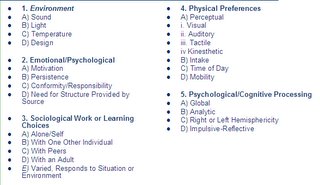Sneaks and Ladders
We actually started this study from foundations taken from the study of student Learning Styles, which is defined as “the way each learner begins to concentrate, process, and retain new and difficult information.” The existence of learning styles means that there are different learning preferences between different people, and that justify this study, as we embark to find some conditions in which most people would prefer, or not-prefer rather, in light of the laddering technique; but either way, by examining these preferences we would be able to do a survey study and then suggest improvements.
We based the possible factors of learning on the Dunn & Dunn Learning Style model, which sums up an individual's learning style based on a combination of affective, cognitive, environmental and physiological factors. The factors in the learning style model are as follows...

With these factors in mind, Si Wei and I went about our sneaking (Ethnography) to identify what could be the possible factors that account for different student behaviour, mainly attendance and sleeping, in different lectures. In the end, we decided to short-list down to two factors, one technological, which we chose to do: Seats, in the vein of an Environment - Design factor based on the above chart, and one cultural factor, Time of Day, from the Physical Preferences category. We decided to go with a depth-approach, more so than an all encompassing-breadth, which we later discovered that many of our peers did.
For the my part Time of Day , we attended different lecture slots at different times of the day, to gauge the behaviour of students, and it was discovered that in 8am lectures, students are either late, sleeping, or not even present in the first place, as reflected by the poor attendance. This observation is reflected and supported in Andre's and Chee Kit's group as well, in which they plotted a chart to trace the rate at which the students entered the LT during an 8am lecture. The laddering process later revealed some VERY INSIGHTFUL truths...

... like sleeping in lecture is unproductive. Ok, so maybe we all knew that already.
But either way, we decided to head to the streets (more like the canteens), to garner some word of the public on the issue of morning lectures. After 30 students and 5 questions later, here is what we concluded.:-
- Most students don’t like lectures that are too early (before 10am) or too late (after 6pm).
- Students dislike early lectures more than late lectures.
- Most students admit to being unproductive /falling asleep during 8am lectures.
- Most students are occasionally late for morning lectures.
- Students are more likely to skip lectures that are too early or too late.
- Students claim to be productive in lectures that fall between 10am – 4pm.
Thus, in light to morning lectures, here is what we suggest:-
- ABOLISH 8am lectures (lessons) and after 6pm lectures. (As if that would be possible).
- Try to schedule lectures between 10am-4pm.
- Schedule tutorials at “unwanted” timings instead of lectures.
- Lecturers can start a bit later for morning lectures, to accommodate to late-comers.
- Give breaks during lectures (for better student concentration, studies have shown this).
- TRY to keep content and delivery interesting.
In conclusion, even though learning preferences are very subjective to the individual, and there might not be any conclusion to a lot of the possible factors to learning, since "one man's meat[could be] another man's poison" and there are some things where we can all agree to disagree, there are some things that people universally regard as "poison," and morning lectures is one of them. Even the stars, horoscope, feng shui and superstition agrees with this point (ref: Chung Hau's group on feng shui and morning hours.) But overall, it is quite hard to pinpoint one particular factor as being the cause for a bad learning experience in LTs, especially through the use of ethnography and laddering, as what is observed and said, its sometimes a result of numerous factors at play at once, and even though it might be at the tip of the tongue for most as the main reason, it is not the only reason as to why they have bad learning experiences. So, the bottomline is, more in-depth study would probably be needed if we were to study any of the factors of improving learning experiences, after all, there is no guarantee that people won't fall asleep even in an omni-theatre, right?

0 Comments:
Post a Comment
<< Home